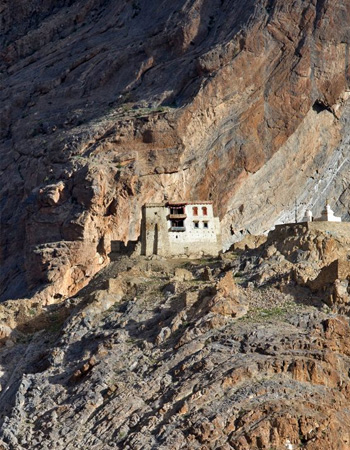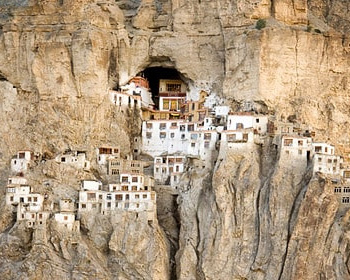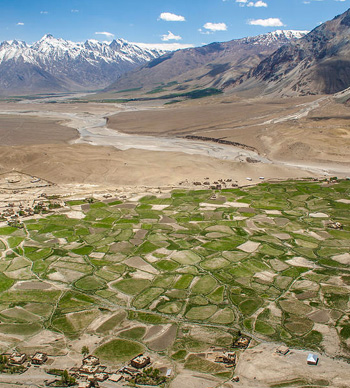Based on the Life and Times of Alexander Cosma de Koros
By Ramesh Sharma
Among the great adventurers of the 19th century the name of the great Hungarian linguist and scholar Csoma De Koros, also called Alexander Csoma de Koros, is celebrated as one, whose life and times, stood testimony to his unique contribution and understanding of the Orient and Tibetan Buddhism.
The feature film we propose takes us through the incredible journey of Csoma, who set out on foot in 1820 from Hungary, to find the roots of the Hungarian people, who, he believed, came from Central Asia. Through Aleppo (Syria), Teheran (Iran) and Kabul (Afghanistan) - Csoma ends up en route to Ladakh where he meets an Englishman, William Moorcroft leading a major expedition to Bukhara (Central Asia).
Our film begins with preparations for an investigation in Calcutta’s prestigious Asiatic Society. It is 1838. The East India Company from England has begun consolidating its hold in India. And first stirrings of The Great Game, between Russia and England, is being played out.
The subject of investigation is the Hungarian linguist Alexander Csoma. His alleged crime - principally of being a Russian spy and secondary charges of having stolen and conspired to forge a letter from a monastery in Ladakh. He is also accused of doing nothing to stop the murder plot of a teacher Phuntsok Sangye - who Csoma claims gave him the letter in the first place. Sangye has disappeared mysteriously. The letter allegedly written by Jamyang Rimpoche (the head abbot of the monastery) who died when Csoma was there and who in this letter claims that he will not be reborn again ever again. His detractors claim that Csoma as a Russian spy of being privy to the plot to kill Jamyang Rimpoche’s closest confidante (Sangye Phuntsok) The film narrates the intrigues and politics of that era - specifically the politics of reincarnation.
We witness attempts to discredit Csoma's academic works by rival European priests, who were also pursuing the study of Tibetan Buddhism.
As his testimony unfolds we learn that Csoma had been sent to the monasteries of Ladakh by Capt William Moorcraft - a British spy who, ostensibly, was on his way to Bukhara to buy studs for the East India Company. Csoma had met Moorcraft in Dras near Kargil in Northern India. But Moorcraft is killed during his travels to Bukhara and cannot corroborate Csoma’s testimony.
Through his testimony we see in flashback Csoma’s incredible saga.. his early days in Hungary, his travels through the most hostile regions, his adventures and his love and loss. Through this all we come to understand Csoma and his motivations.
The investigation ends with Csoma being vindicated by a group of eminent scholars - led by the Secretary of the Asiatic Society Mr Princep and backed by the Governor General of India Lord Amherst.
They stand by Csoma testimony. In the process they expose intrigues and machinations of other academics like Patrick Fleming. They are the real villains of the story and work along with a coterie of monks who want to take over the Zangla monastery and enthrone one of their nominees as the reincarnate. The English scholars on the other hand wish to usurp Csoma’s research as their own and publish it in England.
The end of the investigation also brings a reunion of Csoma with his love Julie. Julie is a nurse and daughter of a Scottish priest Rev Johnston, who has been proselytizing in Himachal and the borders of Tibet - converting the natives into Christianity. Csoma and Julie had fallen in love - but in Simla when his troubles begin- Csoma thinks that Julie has betrayed his trust and breaks off their relationship.
It is Julie's robust defense during the trial, even at the cost of alienating her widower father, that redeems and saves Csoma.
Csoma and Julie now set out to journey to Tibet. Traveling through the dense mosquito infested tropical forests of the Terai region, Csoma contracts malaria. Csoma tragically dies in Darjeeling. His funeral is attended by the expatriate British community - but the Buddhist monks who think of Csoma as a great scholar - and a Boddhisattva - have their own funeral service, for him, as well.
That night, after his funeral, a mysterious fire destroys the cottage in which Csoma and Julie lived in . She survives along with a trunk which contain his writings. The last part of the film is narrated by her.
← Back to Projects


